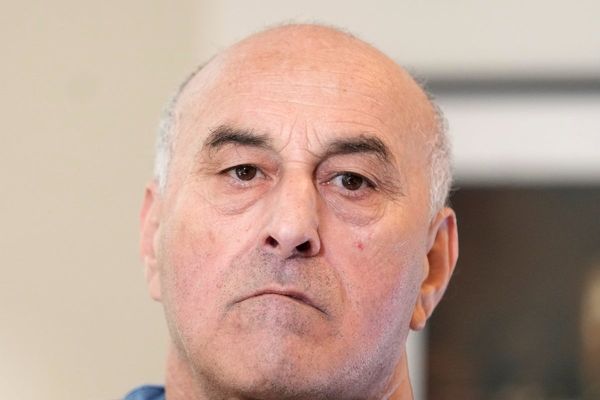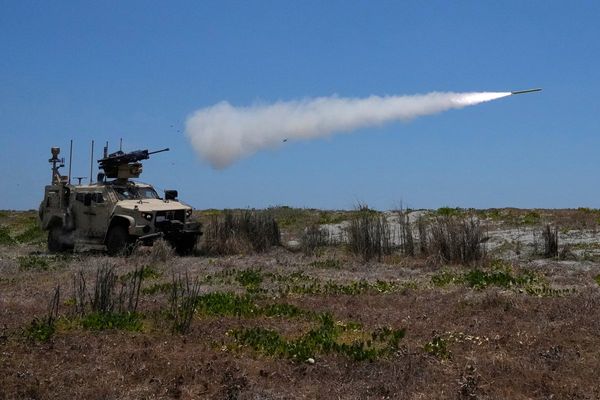
US mediator Amos Hochstein has presented a written proposal for maritime boundary demarcation between Lebanon and Israel that establishes a qualitative breakthrough in the indirect negotiations between the two enemy states.
Lebanese Parliament Speaker Nabih Berri had labeled the proposal as a “draft deal” that meets Lebanon's demands.
“In principle, it meets Lebanese demands which refuse to give any effect to the maritime agreement on land borders,” Berri told Asharq Al-Awsat minutes after US Ambassador Dorothy Shea left his office.
A Lebanese committee including Deputy Parliament Speaker Elias Bou Saab, Director General of the Presidency Antoine Choucair, Parliament Speaker Advisor Ali Hamdan, and a technical army officer will meet in the coming 24 hours, Asharq Al-Awsat learned.
The committee will review the notes of Lebanese officials regarding the proposal and present amendments if the need arises.
Bou Saab, who is also Lebanon’s lead negotiator on the maritime border dispute with Israel, said that the atmosphere is more “positive” than ever.
“We are waiting for the committee meeting, which will be held after translating the agreement into Arabic, to put forward the Lebanese comments on it,” he told Asharq Al-Awsat, affirming that amendments will be made to the draft proposal.
“The US ambassador confirmed that the text is not final, and therefore subject to amendment,” Bou Saab revealed. However, the deputy parliament speaker stressed that the amendments to be presented by Lebanon will be “extraneous.”
Bou Saab highlighted that the proposal was mainly “agreed upon,” but stressed that it still needed technical and legal translation.
According to him, the agreement proposal represents the yield of a “unified Lebanese position.”
“Things seem very positive,” Shea commented after meeting Berri, who when asked if the development is any success said it was good for a start.
“The 10-page agreement is written in English and requires studying before presenting a final response,” explained Berri, pointing out that he, President Michel Aoun and Prime Minister Najib Mikati were reviewing the proposal with their aides.
After revision, Aoun, Berri and Mikati will consult with one another before giving an answer to the US-brokered deal.
If all goes well, Lebanon and Israel will sign the deal in the border city of Naqoura, Berri asserted, as this is per the framework agreement he reached with the US last year.
Sources familiar with Shea’s meetings told Asharq Al-Awsat that a tripartite meeting will take place in the middle of next week to agree on the official Lebanese response.
The same sources revealed that the US wants a deal to be concluded as soon as possible, i.e. within the next two weeks.
Shea had handed each of Aoun, Berri and Mikati a copy of Hochstein’s written proposal.
The Lebanese presidency had affirmed that Aoun met with Shea and received the written proposal from Hochstein for the demarcation of the maritime border with Israel.
Aoun then contacted Berri and Mikati for a consultation on the US proposal. He discussed with the two “how to move forward to provide a Lebanese response as soon as possible.”
This is the first time since the start of indirect negotiations between Lebanon and Israel two years ago that a written letter has been submitted by the US regarding the demarcation of maritime borders.
After a months-long stalemate, the file gained some momentum after a production and storage vessel arrived near the disputed Karish field last June.
Indirect negotiations between Lebanon and Israel started in 2020. They stopped in May 2021.
Originally, talks were supposed to discuss an 860-square-kilometer disputed area which is defined by borders known as “line 23,” according to a map sent by Lebanon to the United Nations in 2011.
However, Lebanon later considered that the map was based on wrong estimates and demanded that an additional 1,430 square kilometers be considered, including parts of the Karish field.
After the arrival of the gas extraction platform off the Israeli coast, Lebanon called on Hochstein to resume negotiations.
The Mediterranean nation also presented a new offer for demarcating borders without including the Karish gas field. It, however, included the Qana gas field.
Reaching an agreement would facilitate the exploration of oil resources within Lebanon’s territorial waters.
Lebanese authorities are counting on the presence of oil reserves as this could help their country to overcome a catastrophic economic collapse that’s been going on for nearly three years.
Hezbollah leader Hassan Nasrallah lauded the US-mediated draft proposal to resolve a maritime border dispute between Israel and Lebanon as “a very important step.”
In a change of tone, Nasrallah said that Lebanon’s state officials are the ones to decide on the proposal. He had hinted at escalation several times previously.







